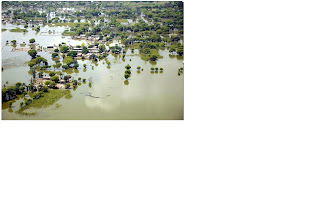Tuesday, 6 September 2011
Rajan Pur, Punjab: An aerial view of flooded areas. | Photo by Mk Chaudhry/EPA (via The Guardian: Pakistan Floods: The Displaced and the Saved)
Triggered by monsoon rains in late July, Pakistan has been experiencing its worst flooding since 1929. Rivers burst their banks and entire communities have been destroyed. More than 20 million people have been affected by the floods, which is more than the number of people affected by the 2005 South Asia tsunami, the 2005 South Asia earthquake and the 2010 Haiti earthquake combined. Pakistan's infrastructure is severely crippled, and millions of displaced people are at risk of falling ill from water borne disease, food shortages, and lack of access to clean water and medical care. The United Nations' Ban Ki-moon counts it as the worst natural disaster he's witnessed, and presses for increased international attention. Pakistan's Prime Minister, Yousaf Raza Gilani, has even compared the challenges the country now faces to those during the 1947 partition of the subcontinent in which around half a million people were killed in mass violence. So how can we as a digitally connected global society lend a hand?
Crowdsourcing, using a group of amateurs or volunteers to solve a problem, has been repeatedly mentioned as a new tool to address development needs. It has been cited often in the news and blogs as capable of mobilizing the public for Pakistan's flood victims. It is accessible, and allows anyone with an internet connection or a cell phone to get connected and be of service through multiple channels. (We've covered crowdsourcing before on Worldchanging, see for example these post on: on deliberative and collaborative democracy, governance, and Jeff Howe, who coined the term.)
Organizations like Crisis Commons are mobilizing volunteers from the Silicon Valley to London for Pakistan, and are also providing additional crowdsourcing resources to facilitate volunteer participation.
Aid organizations are taking notice of the effectiveness of crowdsourcing, and both private and non-profit partnerships are taking hold: CrowdFlower, a for-profit company, generously donated their software to PakReport, which is primarily a map of real-time data collected from aid agencies, the media, and direct reports by email and text messaging. The map shows what resources are needed in flood affected regions and volunteers all over the world can process the requests:
Subscribe to:
Post Comments (Atom)

its very sad news for pakistani's.....
ReplyDelete